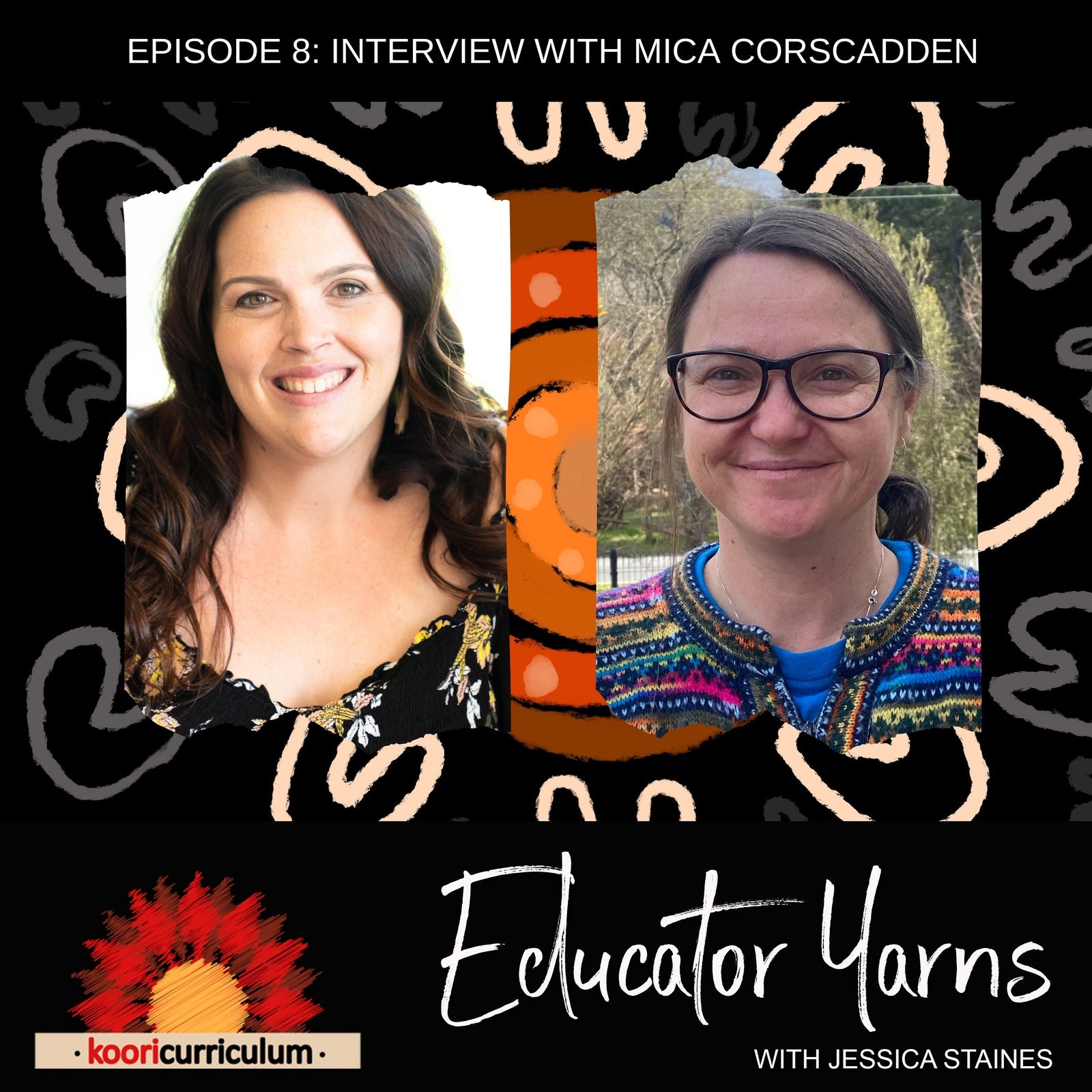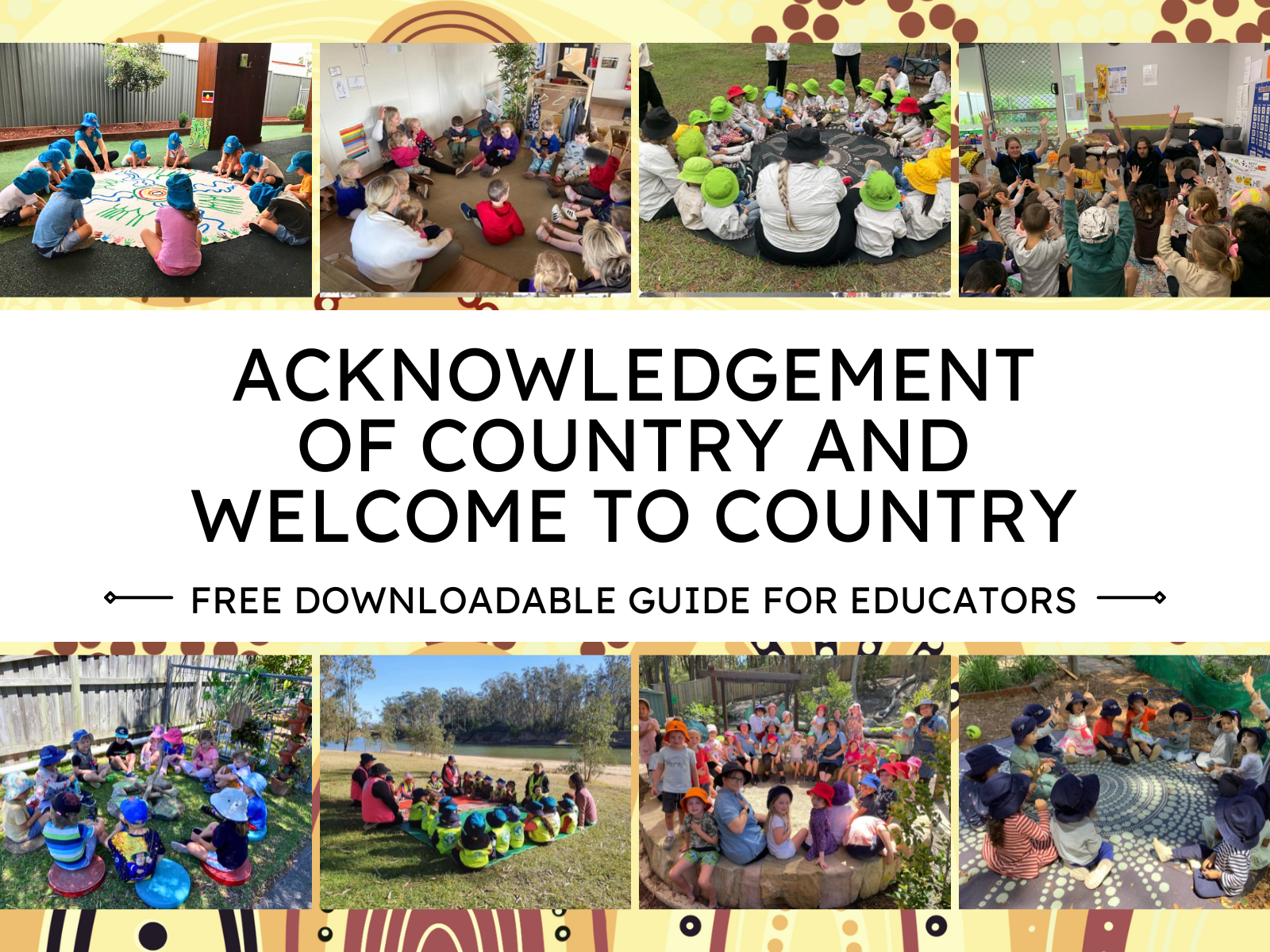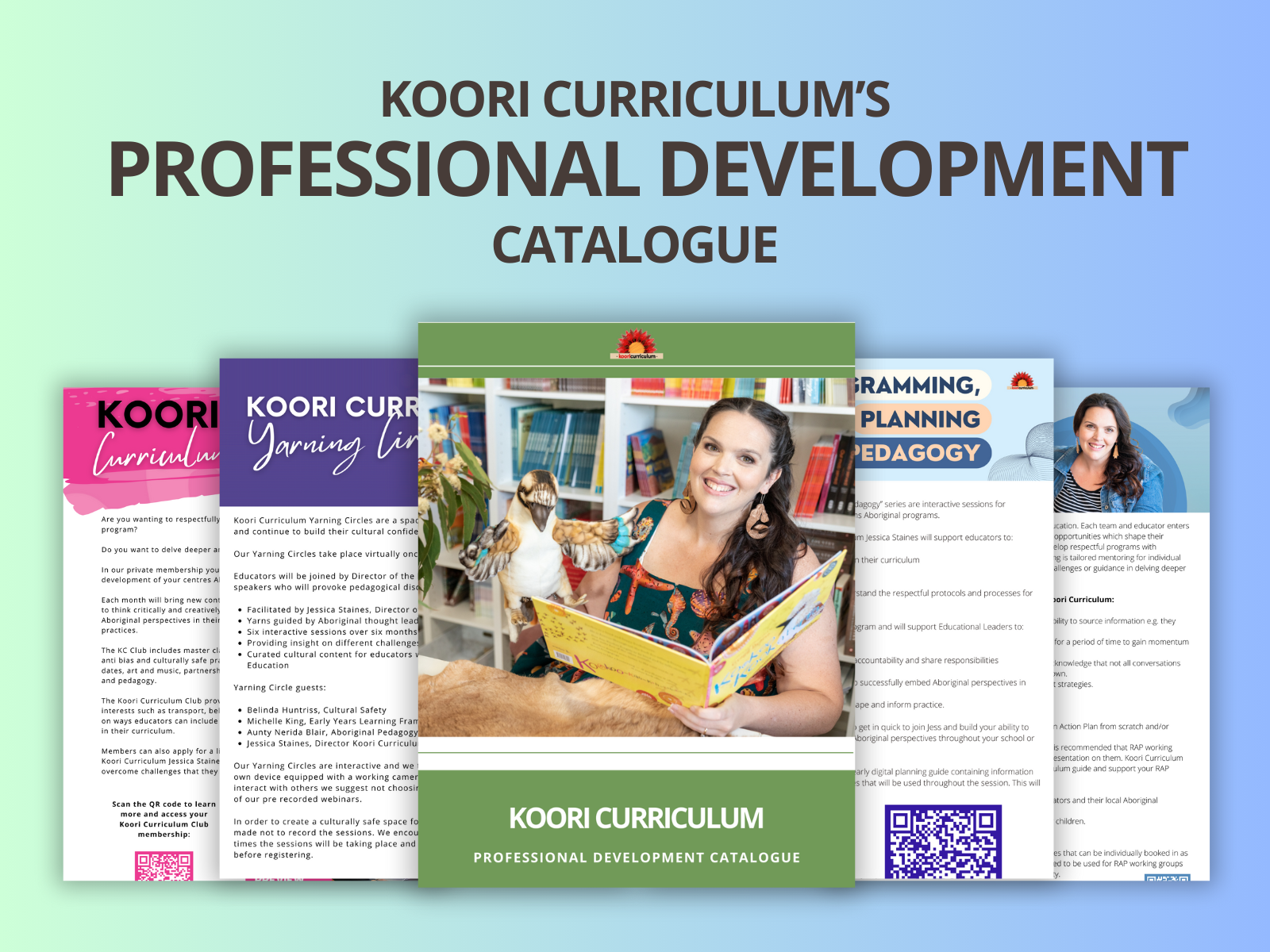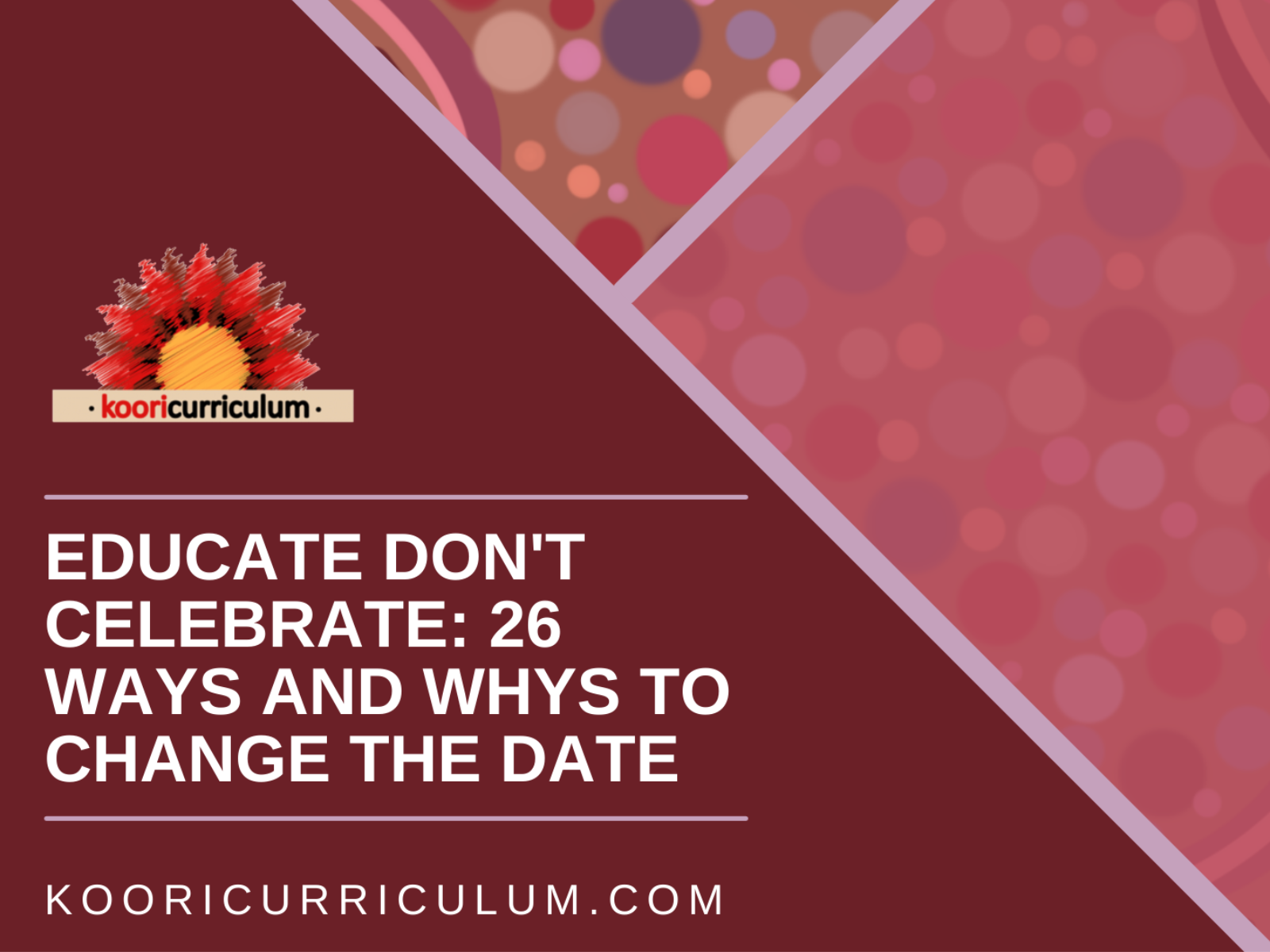
Educator Yarns Season 2 Episode 8: Interview with Mica Corscadden
Today on Educator Yarns, Jessica Staines speaks with Mica Corscadden. Educator at Harrietville Bush Kinder on Dhudhuroa land in Victoria
Mica talks about how her passion for country and nature lead her on a journey to connect with local community. Mica yarns about how she engaged the community in consultation to ensure authenticity and respect.
SHOW NOTES
Speaker 1:
Learning history. And that's obviously, you laugh, you cry, you get angry and...
Speaker 2:
We're Aboriginal and Torres Strait Islander peoples, so we're not the same. Between all of us, we're our own peoples in our own rights.
Speaker 1:
Talk to as many people as you can about it. I think all of that learning is really important to give educators the power, to try and take those steps and have those conversations as to why it is so critical.
Speaker 3:
You're listening to the Koori Curriculum Educator Yarns with Jessica Staines.
Jessica Staines:
I'd like to acknowledge the darker young people, the traditional owners of the land on which I am recording this podcast. I pay my respects to their elders, both past present and emerging and pay my respects to all Aboriginal and Torres Strait Islander listeners.
Hi Everyone. My name is Jessica stains, director of the Koori Curriculum. For those of you that aren't familiar with our podcast, season two is all about our new book, "Educator Yarns". We're meeting and interviewing with our educator contributors from right around Australia, who will be sharing little snippets of their piece. It will be a combination of stories about why embedding Aboriginal perspectives is so important, how to connect with local community, how to embed Aboriginal perspectives in our program, how to work with anti-biased approaches and so much more. So make sure you listen in and enjoy the episode. Bye for now.
On today's episode, we're going to be meeting with Mica. Who's an educator from down in Victoria who is extremely passionate about nature, play and pedagogy. However, we're going to spend a little bit of time really yarning about some of the pieces of Aboriginal culture that give educators the jitters, I guess.
That there's lots of conflicting advice and these things tend to be around topics like face painting, dot painting, the inclusion of dreaming stories and of course, the teaching of totems. So, I try as much as I can in my practice to say to educators that there is no right or wrong, black or white. There's no umbrella approach to doing this work. Instead, everything is relative to the context of the service and how these aspects are included, who is giving permission and who is teaching them. So we're going to hear a little bit about Mica’s journey and get her on the line now.
Well, thanks so much for jumping on and having a yarn about our Educator Yarns book.
Mica:
My pleasure, thank you.
Jessica Staines:
So do you just want to kick off by introducing yourself?
Mica:
Yeah, sure. My name is Mica Coscattin. I've worked in early childhood education for around 12 years.
I've nearly completed my early childhood education degree, which is really exciting.
Jessica Staines:
Congratulations.
Mica:
Yeah, thank you.
So I'm just doing my placement and obviously in this crazy, beautiful world we're living in, it's a bit tricky to do that at the moment. I've always just been really passionate about nature pedagogy. That's been my biggest thing about getting children back to nature. So, I've worked in long childcare services for over 12 years and currently an educator for Harrietville Bush Kinder, which is a really big passion for us.
Jessica Staines:
Yeah, it sounds like your workplace is pretty special. Do you want to explain, a little, what Harrietville Bush Kinder is? Because a lot of people might not realize the different... I know a lot of people do Bush school and stuff, but it's sometimes, just like a little one hour, or two hour offsite, but this is a little bit different.
Mica:
It is.
Diane, who I work with, we originally started doing nature programs through another center and then we came up with the idea of Harrietville Bush Kinder. It was probably about three years ago and we're really fortunate to have a really supportive school behind us here in Harrietville and I actually live in Harrietville. So, I knew that there were some really good sites that we could use for our classroom, outdoor sites. So, about 18 months ago, we plunged into it. We were pretty-nervous but we actually have a 15 hour programe, three days a week, and two of those days we are outdoors in our Bush setting. So we spend 10 hours in our outdoor learning class, I don't think I've heard of anyone else doing that.
Jessica Staines:
No, amazing.
Mica:
The children can be a little hesitant with it sometimes, especially here in the Alpine area where we live. The coldest mornings has been minus four, that's when we'll go for scavenger hunts or go walking and get their bodies moving. We do still have access to music and they love starting the morning off with music.
Where our yarning circle is, we have logs and they use those for standing and balancing. So, it's a really good area and we're really passionate about using real tools and a lot of natural loose parts that are around the children but the real tools that we have, we have real saws, real hand drills, hammers, nails, they do have access to magnifying glasses. So, they've got a bit of that technology there as well and it's a bit of a balance and we do set up a yarning mat where the children have access to books. If they would like to sit and have a chill and we also build a lot of gunyahs, which is the word for huts, and they use those as their play-spaces as well.
Jessica Staines:
Yeah, incredible. You were working at a preschool with Diane before you started doing Bush Kinder, weren't you?
Mica:
Yes, we were. We were working at a childcare centre in Bright and that's where we started the nature programe and we could just see the learning of the children, the passion. We were only out there for one and a half to two hours but, because we had to get back to the centre for routine things like lumps and all those things, it really was heartbreaking when the children were like, "No, we don't want to go". So, that's where we found that we really wanted to have more time and have lunch outside, have all of those things. Yeah, just have the whole class outside and in all weather, except for extreme weather. We do have a benefit risk assessment for extreme weather and that's what Diane and I do. We do benefit risk assessments for everything.
Jessica Staines:
Well, you're living most educator's dreams.
Mica:
We know how fortunate we are and we've got the support Jess. That's the biggest thing, I think you need to have the educators that have that passion and are happy to go and get wet and wear mud-pants and be in that environment yourself. Diane and I are really passionate about doing that for the children, for our own well-being. We've seen the benefits and we're also leading in the path of embedding Aboriginal perspectives. We're really fortunate to have a teacher, Rebecca Crawley, who comes in every second Friday and actually teaches the children Boudreaux language, which is our local recognized language and that to me, is the richest. You can't go past having language embedded. It's incredible.
Jessica Staines:
Rebecca is the Aboriginal languages teacher at Bright Public?
Mica:
She was, she's not there anymore. She's a very busy person because she also runs a cafe called Dumu Cafe in Bright, which is, I hope I'm going to say this right, it's for the Tumour Foundation. Basically, students, adults and young teenagers, they come down from a community in Ward Air.
Jessica Staines:
Yeah, that's right.
Mica:
And then they come down and they learn cafe skills and life skills, all those sorts of things and then they take that back into their own community in Ward Air.
Jessica Staines:
Yes, so cool. There's a local spot in Sydney called Tranby who for a long time has done similar things like different courses and so forth.
Mica:
Fantastic.
Jessica Staines:
Yeah, they're really good initiatives. So, Rebecca is indigenous, isn't she?
Mica:
She's actually not, she's got a massive connection. Her and her partner and her children, they took a plunge years ago and moved up to Ward Air. And they lived there for quite a few years and that's how the initiative started with the Cafe and they're very welcomed in the community, they're very much a part of the Ward Air community, they're very well-respected. They lived up there, I think, for four or five years and then they brought the Cafe down here when Beck started teaching indigenous studies at Bright P-12. I've known Beck personally for quite a lot of years because her sons are the same age as my daughter and my daughter actually did indigenous studies with Beck. And that was another way we started having those really good, robust conversations at home about indigenous rights and it was sort of the foundation for me I suppose, and having those connections and learning history. And obviously, you laugh, you cry, you get angry and then you want to do something about it. That was the big thing for me.
Jessica Staines:
For sure, who are the traditional owners of the land where Harrietville Bush Kinder is on?
Mica:
Harrietville Bush Kinder is Dodoroa land and in Bright, it's Tunra. So, it's a little bit tricky. I don't want to speak out of my...
Jessica Staines:
No, that's fine.
Other than Rebecca, have you got connections in community with Aboriginal people?
Mica:
Yeah, we do. So Beck works really closely with Gary Murray and he's written a draught of the Dural dictionary. And also we're really lucky in the last 18 months, we've connected with Jyada and he's a Dodoroa descendant and he was the one who came in and did our welcome to country ceremony, when we had the three flags raised, here at the school, and the children were just blown away having the smoking ceremony, seeing his possum skin. He came and did ochre painting with the children and having that connection was just... They still talk about it.
It's really exciting. Yesterday, we put up the National Aboriginal Torres Strait Islander children's day poster. We had great discussions about one, whether or not it was a boy or a girl in the picture and then of course the ochre paint came out and they all wanted to look like the child in the poster, so we all painted their faces and they loved it, we made the paint and... Sorry, I think I got off track a little bit there. So we do have connections with Jyada and Gary, which is fantastic.
Jessica Staines:
And the reason that I want to say that is because, in your piece, there's a couple of things that I think are controversial, depending on the community that you're working in.
Mica:
Absolutely.
Jessica Staines:
When I do my workshops and all the time, we get emails at Koori Curriculum where educators are saying, "Can we have the didgeridoo as a part of our programe, can we do dot painting? Can we paint children's faces? Can we teach dreaming stories? Can we teach about totems? Can we teach Language?". So, all of these things, for me, they're traditional parts of our culture that have to be embraced but in a very sensitive and mindful way.
Mica:
Absolutely.
Jessica Staines:
Because there's a lot of protocols that go with that. So, with totems, I know that Rebecca and yourself and Diane have all got the children really learning about totems and the children are identifying animals or birds that they feel a particular connection with, how they can be custodians and this is all linked in with your acknowledgement of country. [crosstalk 00:13:14] Harrietville Bush Kinder is very different, in the sense that you've had a lot of consultation and relationships with community and this has been done in consultation and in partnership with them and they're leading that aspect of your programe.
Mica:
We wouldn't feel comfortable doing it, if that wasn't the case. The totems were a big one for me. I was like, "I even feel a bit funny". I know Diane actually listened, she did your conference over the school holidays and she listened to the one about dream-time stories and we've always found... To be honest Jess, it's a really hard one because there is that borderline of a belief system and almost a religion. So, where we work, in early childhood, obviously we've got to be quite diverse and open. Here on the land that we are on, we don't have access to a lot of dream-time stories because Dural is a sleeping language, that's why we're trying to help wake it up.
You don't want to step on toes. The totems as I said, that was a bit of a tricky one for me. I had a good chat to Beck about it and it's interesting, the children have really led it in the way of... We went for a little bit of a walk and Beck was explaining about connecting to your totem and I understand that totems are actually part of the family identification in that sense, you have your own totem as part of a family, if I'm right, and we felt a little bit weird going into finding our own totem, if you know what I mean. The children have really led it to more using the language of what the totem is. For example, one of the children, he's a fish. So in every story that we read, if there's a fish he'll go, "Ah, there's my yambao". So, I think they've taken it more as a language, not just the animal. Does that make sense?
Jessica Staines:
It makes sense, and I think the thing is what's really important and what I've tried to do in the book, and what I'm saying in this podcast is that it's all relative as to how you do it and the relationships that you've built with community, because what you're doing in your community... And that's why it's really important for educators to really listen and be mindful too. This is not a cookie-cutter approach.
Mica:
No, definitely not.
Jessica Staines:
They can't take everything you're doing at Bush Kinder and dump it in their centre at Brighton-Le-Sands or something like that. You know what I mean? They've got to look at the processes. In your story, you really talk about struggling to find community connections. And then [inaudible 00:16:14] where meeting one person led to the next person, which led to the next person. Then, whilst you and Diane were really passionate about what you wanted to do, there are other educators in your team that weren't there with you yet and giving the whole team professional development training and so forth.
So, I think it's that process that we really want educators to be listening to and understanding that it's all about relationship building and it's through those relationships that allows you to stand behind your curriculum with cultural integrity and respect, because undoubtedly you've had discussions with all these community members that you've named so far in this podcast, and that you've written in the book. You've had conversations and consultation with them about your totems and how you're using language to make sure you're doing it in a respectful way. So, in your community, they're happy for you to be using ochre and talking about totems and so on and so forth and using language. That they're happy for that to be happening, whereas in other communities, they're not happy for that to happen at all.
Mica:
And that's understandable, I think too, I really do.
Jessica Staines:
Yeah, and I think because there's a very fine line between cultural appreciation and cultural appropriation. So, when I was reading your piece, I really had to stop for a minute and think, "Okay, so it's this community's context with these relationships, with that support". And as you said, your colleague, Diane has done some of my workshops and I often advise educators not to teach dreaming-stories because, for me, it is about spirituality. I think that, there's some things that is for community and family to share with their children and not to be appropriated by non-indigenous teachers but with consultation with your families in your community, if they want that being shared in their context, it's not for me to say.
I have my opinions and my views in the communities that I've worked in and my experience but in your community, you're on a different journey and that all comes back to understanding that we're Aboriginal and Torres Strait Islander peoples, so we're not the same.
Mica:
Definitely not.
Jessica Staines:
At least between all of us we're our own peoples in our own rights. We've got our own protocols and ways of doing things. So, there are overarching principles but the main thing here is that everything... When people say to me, "Is it okay? Can I do this? Can I do that?" In order for us to embed Aboriginal perspectives in our programme, we need to understand what the perspectives are of our local Aboriginal community.
Mica:
Yeah, that's the key isn't it? Definitely.
Jessica Staines:
A difference to the perspectives of the people in your community. So, you need to take a step back first and say, "Okay, so what do they want you to teach? What relationships have you established?" That is number one, that's what has to come first.
Mica:
And that was a really hard journey for us, it really was. That was where we were fortunate to have Beck. She brought some of her students over to the childcare centre where we were working to read stories and the children were so interested. That was another way that it was founded and also connecting with our local KESO officer, Tammy. She really affirmed what we were doing was right because it's still, the talking... In early childhood education, what I see, is a lot of people are really scared about embedding Aboriginal perspectives because they don't want to offend anybody. They don't want to be tokenistic at the same time. So, they just don't do it Jess and that's where I think having those communications, talking, that's what is the biggest thing, isn't it? Talk to as many people as you can about it and connect with your local KESO officer.
And as I said, in my piece, we don't have any Koori kids in our childcare centre but she was happy to come across and have a talk with us and being part of the CUST training was really crucial and that's what Bright are looking to do but with COVID, they haven't been able to do it, unfortunately. I think all of that learning is really important to give educators the power to try and take those steps and have those conversations as to why it is so critical to embed Aboriginal perspectives across the whole learning programme that you're delivering, have it everywhere, it's very important here.
Jessica Staines:
That's right. And I know for many educators, just like you, developing those community relationships is so incredibly hard. So, if I say to people, "Before you start including Aboriginal perspectives in your programme, you need to have a relationship with community." And then they can't establish those relationships, I feel really deflated. So, I just want to correct myself I suppose, and explain a bit better, I guess. Community relationships are key, particularly when you're thinking about including traditional aspects of culture, like all the things that we listed before. However, if we don't have those community relationships, there's still many things that we can do and instead, I encourage educators to look towards more contemporary aspects of culture. For example, if the children are interested in dolls, then we have black dollies in home corner and we have mums and bubs posters about breastfeeding.
And we have Aboriginal printed blankets to wrap our dollies up in because none of that is traditional, that's all contemporary but, it's still including Aboriginal perspectives and including Aboriginal people. Or in our book corner, instead of having dreaming-stories, we look at books like "On the Way to Nana's House", which is a story about an Aboriginal family that's on a road trip to see Nan and it's about all the things they can out the window along the way. It's still inclusive of Aboriginal people, but it's contemporary. It's got nothing to do with traditional aspects of culture. So, I think there are safer places to begin and start than looking at things that need a lot more consultation and thinking.
Mica:
And Jess, one of the things that we're going back to is the three flags, having the three flags together. One of my little ones came out to me the other day, he pointed at the flags on the table and he says, "I love the Torres Strait Islander flag" And I said, "Oh why?" And he started speaking about the colours and the symbolism and then we started speaking about how important it is, we think and the children definitely think, that the three flags always need to be flown together. That's really important. I think the flags you can do so much with, as well, you can go in so many different learning paths with the flags and different ways of teaching it. That's just one thing that we have found the children have really embraced as well.
Jessica Staines:
Yes, and I think in your piece, you talked in depth about a lot of the different ways that you're celebrating culture in your programme, both when you were in a preschool context and since you've been at Bush Kinder. Thank you so much, thank you for jumping on and yarning with us and sharing a little bit more about your piece and who you are and I'm really looking forward to the "Educator Yarns" book coming out later. So everyone can see the experiences and things that you're doing because it's just such an amazing journey that you've been on.
Speaker 2:
Thank you, Jess. Thank you so much for your time and I look forward to meeting you one day.
Jessica Staines:
Yes, I know. After COVID we'll all be together.
Mica:
That'd be fantastic.
Jessica Staines:
I hope that you enjoyed this episode and had a great little sneak-peak between the pages of our new book, "Educator Yarns". If you'd like to ask questions or connect with me, it's best to join our Facebook group, the Koori Curriculum Educator Community, which is free for all of our listeners and members.
Join me next time, where I yarn with Alicia Hanson, the Aboriginal best start facilitator for the Dandenong community and a proud Menang woman, about what it means to connect with your local Aboriginal community and strategies that she suggests that every educator undertakes to form these strong, meaningful, long-lasting relationships.



